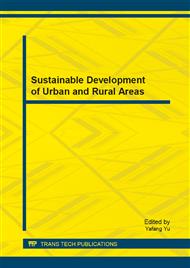p.855
p.859
p.864
p.869
p.874
p.880
p.884
p.888
p.892
Study on Ecological Value of Practical Consciousness of Sustainable Development Based on Chinas Ancient Great Thinkers Thought on Ecological Ethics
Abstract:
The thinking of sustainable development not only respects the intrinsic value of nature, but also defines the human beings transcendent position in the world. At the same time, it determines specifically human subjectivity in the practice, and admits the legitimacy that humans use and transform the nature. Based the understanding of distinction between heaven and man, Tsunzi specifically set forth the eco-ethics practice theory of adapting the law of heaven and making use of it. His theory dialectically integrated human utilization, protection, rights, and obligations to nature, which not only involved human moral courage, but also embraced ecological moral principles of human practice as well as the ethical spirit of pursuing ecological ethic aims.
Info:
Periodical:
Pages:
888-891
DOI:
Citation:
Online since:
January 2014
Authors:
Price:
Сopyright:
© 2014 Trans Tech Publications Ltd. All Rights Reserved
Share:
Citation:


